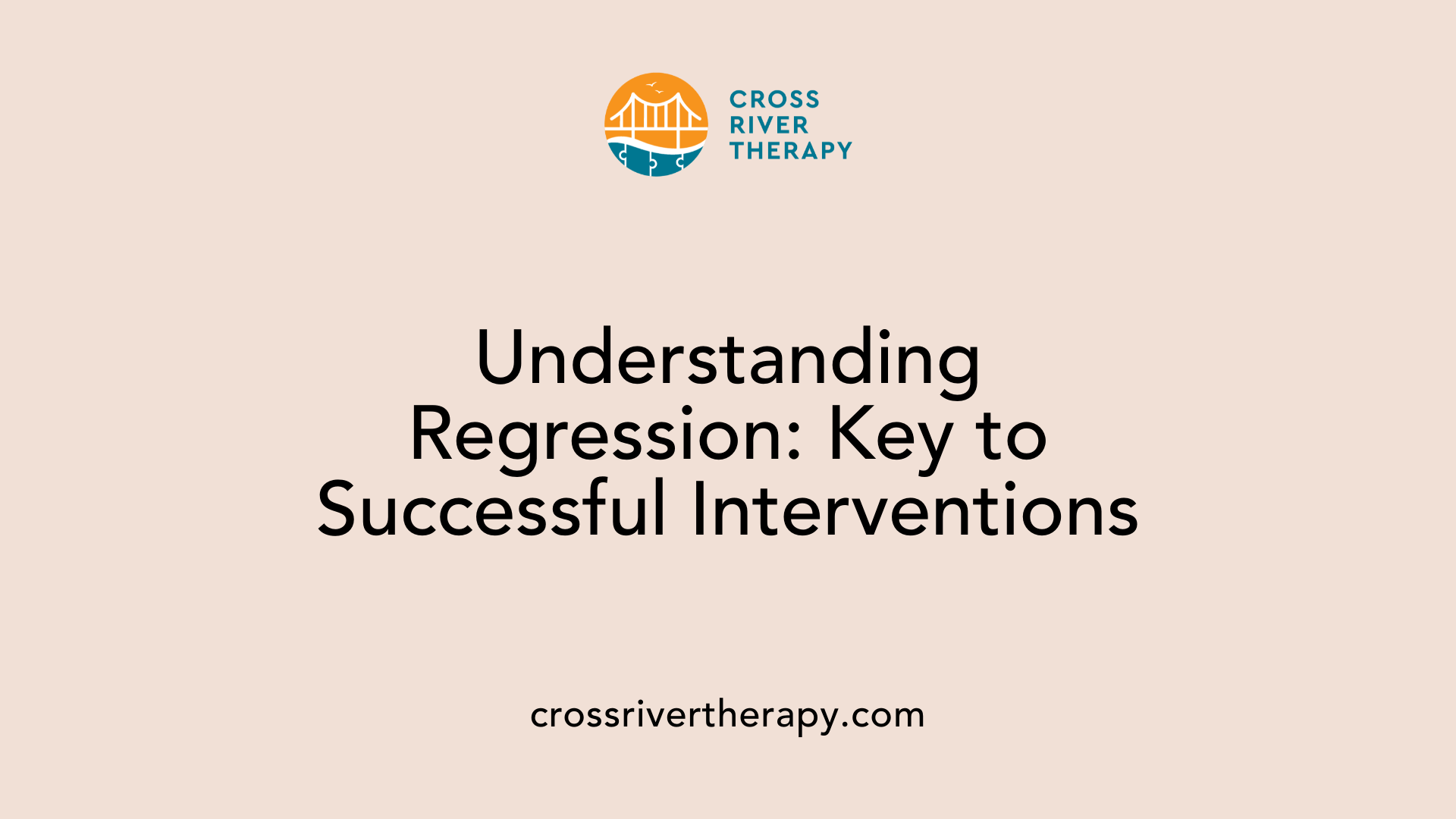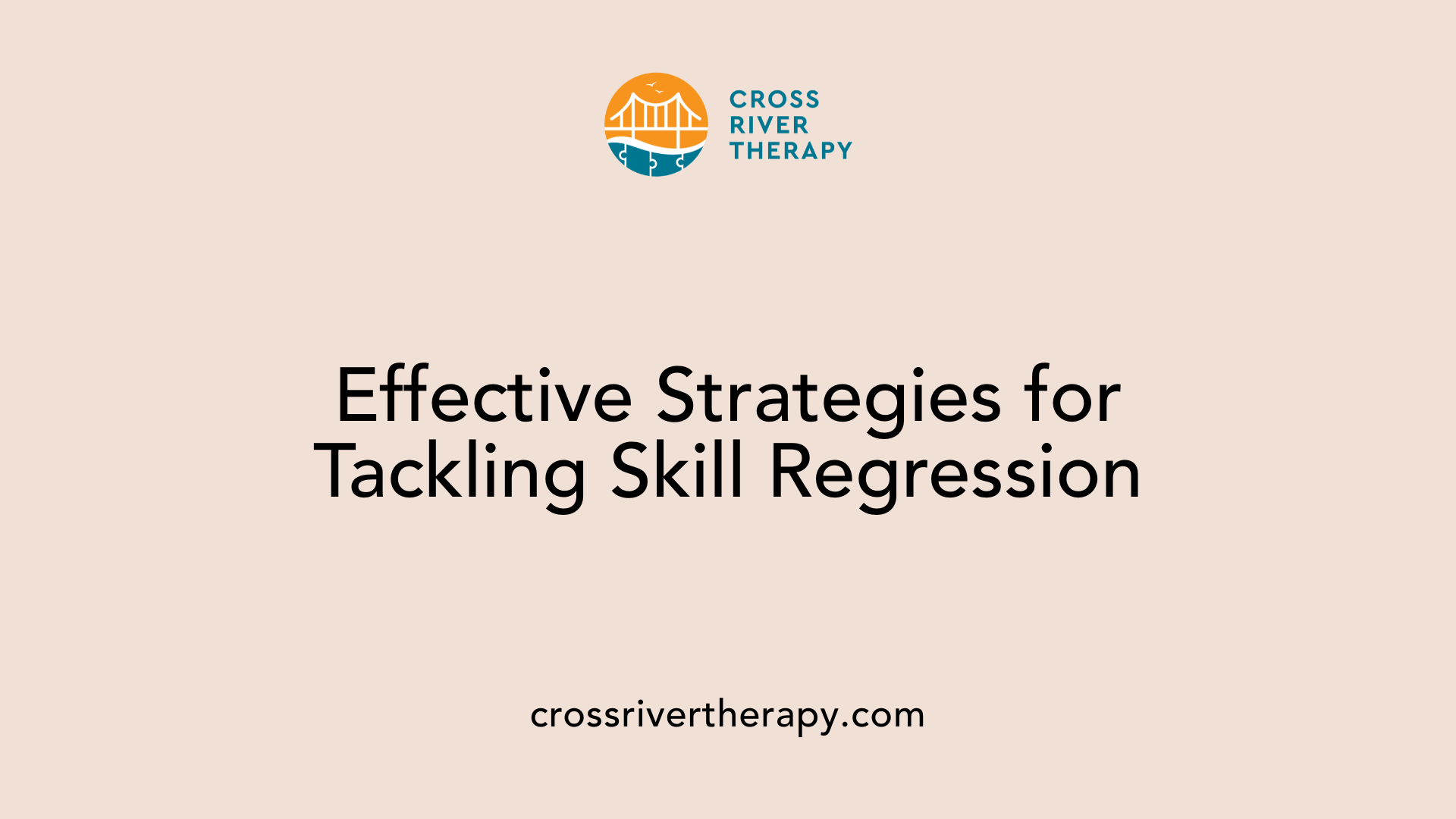How to Handle Regression During ABA Therapy: Tips for Parents
Navigating Skill Loss in ABA: A Guide for Parents
Understanding Regression in ABA Therapy
Regression during Applied Behavior Analysis (ABA) therapy can be an unsettling experience for parents witnessing their children's previously acquired skills seemingly disappear. While the concept of regression might initially seem daunting, understanding its causes and finding effective strategies to handle it is crucial for ensuring your child's continued progress. This article aims to equip parents with insights and practical tips to navigate this often challenging aspect of ABA therapy.
Defining Regression in ABA Therapy

What is regression in ABA therapy?
Regression in ABA therapy refers to instances where a child who has previously acquired skills, such as socializing and verbalizing, may gradually or suddenly lose the ability to demonstrate those learned skills. This can be distressing for families and typically occurs during breaks from structured environments, such as summer vacations or therapy pauses.
What triggers regression?
Several factors can contribute to regression in children undergoing ABA therapy:
- Consistency and Practice: A lack of structured practice can lead to response maintenance failure, making regular reinforcement crucial.
- Environmental Changes: Disruptions in routine, especially during school breaks, can heighten anxiety and further exacerbate skill loss.
- Emotional and Physiological Factors: Illness, stress, or significant life changes can also impact a child’s ability to retain skills.
- Service Levels: Regression may occur when the intensity of services is insufficient or inconsistent.
Addressing skill loss
To effectively combat regression, a structured approach is necessary:
- Reteaching Skills: Families should revisit the methods initially used to teach the lost skills, utilizing familiar principles from the original acquisition process.
- Positive Reinforcement: Following ABA methods, providing tailored reinforcement can encourage a child to regain lost skills.
- Parental Involvement: Actively engaging with children at home reinforces learned behaviors, which is vital for continued progress.
- Monitoring Progress: Keeping detailed records of skill loss enables caregivers and therapists to adjust strategies accordingly and set new goals.
Reinforcing learned skills and maintaining open communication with therapists can help mitigate regression and support continual growth.
The Role of Environment and Routine
Impact of Environment
The environment plays a significant role in the development and maintenance of skills in children, especially those with autism spectrum disorder (ASD). When consistent practice is interrupted, such as during school breaks or vacations, regression of acquired skills may occur. A well-structured environment helps reinforce learned skills, while lack of reinforcement can lead to a decline in abilities, often referred to as 'response maintenance failure.'
Routine Changes Causing Regression
Alterations in routine are crucial factors that can trigger regression. During school breaks, for example, regular activities may diminish, leading to increased anxiety for children. This disruption can hinder their ability to practice and apply learned skills, resulting in noticeable skill loss. Emotional and physiological changes, such as illness or stress, may also contribute to this regression, making it essential for families to observe these conditions closely.
Handling Disruptions
To manage potential regressions, families can implement proactive strategies. Integrating learned skills into daily routines, utilizing visual schedules for consistency, and reviewing therapy plans can help maintain skills. If regression occurs, reassessing the current skill level and employing familiar teaching methods can guide re-acquisition. This process emphasizes patience, flexibility, and celebrating small victories, as recovery is often a non-linear journey.
Parent Involvement in Supporting ABA Therapy
How can parents effectively support ABA therapy sessions?
Parents play a vital role in supporting ABA therapy, enhancing their child's learning experience and outcomes. One of the key ways to provide effective support is through consistent reinforcement of the skills taught during therapy sessions. This involves using similar language, strategies, and methods at home that therapists use, ensuring that children can generalize skills across different environments.
Engagement with therapy
Parental engagement with therapy is crucial for optimizing treatment outcomes. Parents should actively communicate with therapists to monitor their child’s progress, sharing observations and any challenges faced at home. This collaborative approach allows for adjustments in therapy strategies, making them more tailored to the child's evolving needs. Maintaining regular feedback loops fosters a partnership between parents and therapists, encouraging a united front in addressing any regression in skills.
Daily routines integration
Integrating learned skills into daily routines is another effective strategy for parents. By creating structured activities that incorporate communication, social interaction, and daily living skills, families can reinforce what the child learns in therapy. Use of visual schedules can provide predictability and help children transition smoothly between tasks, reducing anxiety related to changes in routine.
This active involvement not only aids in recovery from regression but also builds emotional support, making children feel secure and motivated to learn. As parents establish expectations and celebrate even the smallest victories, they can significantly enhance their child’s progress in ABA therapy.
Developing Consistent Reinforcement Strategies
Using Reinforcement
In ABA therapy, reinforcement is vital for regaining lost skills in children with autism. This involves using positive reinforcement techniques that motivate children to re-engage with previously acquired abilities. For example, verbal praise, tokens, or small rewards can effectively encourage desired behaviors, helping reinforce skill retention and recovery.
Maintaining Consistency
Consistency is paramount in addressing regression. Parents can establish structured environments at home that mirror therapeutic strategies learned during sessions. This consistency supports everyday practice of skills, making it more likely that children will retain them. Regular schedules and routines can help mitigate the effects of any disruptions, like school breaks.
Adapting Strategies
As children progress, adapting reinforcement strategies is essential. Parents should collaborate with therapists to fine-tune approaches based on their child’s evolving needs. Utilizing Functional Behavior Assessments (FBAs) can also help adapt strategies by providing insights into the motivations behind behaviors. This ensures that interventions remain effective and relevant as the child's skills develop or change.
Effective Strategies for Addressing Skill Regression

What are effective strategies to address skill regression in ABA therapy?
To effectively tackle skill regression in Applied Behavior Analysis (ABA) therapy, it's crucial to implement structured routines that provide predictability for individuals with autism. This predictable environment can reduce anxiety and help manage stress triggers that often accompany changes in routine, such as school breaks.
Maintaining Structured Routines
- Visual Schedules: Using visual schedules can offer clarity regarding daily activities, fostering a sense of stability.
- Consistent Practice: Regularly integrating learned skills into daily life can reinforce memory and proficiency. For instance, daily conversations about preferred topics can enhance communication skills.
Mitigating Stress Triggers
- Identify Sensory Overload: Be mindful of sensory environments that may lead to regression, and seek to minimize exposure to overwhelming stimuli.
- Emotional Support: Background noise and intense emotions can disrupt focus, so maintaining a calm and supportive atmosphere is essential for motivation.
Supporting Systems for Skill Retention
- Collaboration with Professionals: Engage with therapists and teachers to develop tailored support systems that consider the unique needs of the individual.
- Celebrate Small Achievements: Recognizing and celebrating progress, no matter how minor, can boost confidence and morale for both the individual and their family.
By implementing these strategies and allowing sufficient time for rest and recovery, families can effectively navigate the challenges of regression, promoting steady skill recovery and continued growth.
Identifying and Managing Regression Triggers

What are the triggers of regression?
Regression in skills can stem from various triggers, often exacerbated during breaks from structured environments. Some common causes include:
- Lack of Practice: Without consistent reinforcement, skills can diminish, as seen during school vacations or therapy breaks, leading to what is termed 'response maintenance failure.'
- Changes in Routine: Breaks from established routines can heighten anxiety, causing additional emotional strain that may contribute to skill loss.
- Physiological Factors: Illness or stress can trigger regression, with emotional fluctuations impacting a child's ability to retain skills.
How can we manage stress and anxiety?
To mitigate anxiety related to regression, proactive strategies are essential:
- Emotional Support: Parents play a crucial role in providing emotional support, fostering motivation and engagement in learning.
- Collaboration: Open communication between parents and therapists helps identify stressful periods and create tailored solutions.
- Structured Environments: Maintaining a predictable schedule at home bolsters learning and helps alleviate anxiety through stability.
How should we adjust routines?
Adapting routines to foster skill retention involves:
- Integrating Skills: Utilize daily routines to practice acquired skills, such as using visual schedules to remind children of tasks.
- Reassessment: In cases of regression, revisiting and reassessing skills using techniques from initial learning can effectively address lost capabilities.
| Trigger Factor | Description | Management Strategies |
|---|---|---|
| Lack of Practice | Skill loss due to inconsistently applied skills | Create structured routines, incorporate daily practice |
| Changes in Routine | Increased anxiety from disrupted schedules | Maintain regular schedules; use visual aids |
| Emotional/Physiological Changes | Illness or stress affecting retention | Provide emotional support and collaborate with professionals |
Building a Collaborative Framework with Professionals

Parent-Professional Collaboration
Collaboration between parents and professionals is essential in managing regression in children with autism. Parents should actively engage with therapists to ensure therapies are aligned with their child's needs. This includes sharing insights about the child's progress and any behaviors of concern. Establishing clear lines of communication fosters a stronger partnership aimed at supporting the child’s development.
Feedback Processes
Providing consistent feedback is vital. Parents can document observed behaviors, skill achievements, or setbacks in daily interactions. This information helps therapists understand the child's progress beyond therapy sessions. Regular discussions about the child's reactions to various strategies allow for the necessary adjustments to be made. Parents should not hesitate to voice their observations, as they are valuable in shaping effective interventions.
Adjusting Therapy Strategies
Therapists must be flexible in their approach to ABA therapy. When regression is identified, revisiting previous successful methods can guide recovery. It’s important for professionals to adjust therapy strategies based on the collaborative feedback from parents. This responsiveness ensures that the therapy remains effective and tailored to the individual needs of the child, promoting best outcomes.
Emphasizing Patience and Flexibility in Therapy

Nonlinear Learning Processes
Recovery of skills in therapy, particularly in the context of Autism Spectrum Disorder (ASD), often follows a nonlinear path. This means that progress may not be steady; instead, it can include periods of regression alongside moments of advancement. Families should approach these fluctuations with an understanding that skill acquisition can vary significantly over time.
Celebrating Small Successes
It’s essential for families to recognize and celebrate small achievements in their child's development, as these victories can help maintain motivation and encourage continued effort. Whether it's a child successfully communicating a need or engaging socially with peers, acknowledging these milestones can boost morale for both the child and family.
Maintaining Optimism
While setbacks in skill development can be discouraging, keeping a positive outlook is crucial. Families are encouraged to practice patience and to reassure themselves that challenges in therapy are normal. Managing expectations and embracing the journey of skill recovery fosters a supportive environment where children feel encouraged to express themselves and regain their skills.
Moving Forward with Confidence
Regression during ABA therapy, while challenging, is an integral part of the learning process for many children with autism. By understanding the factors contributing to regression and employing a thoughtful, strategic approach, parents can play an essential role in helping their children regain lost skills and continue their developmental journey. Through collaboration, patience, and active engagement in therapy, parents can ensure their children benefit from the full potential of ABA therapy, leading to meaningful and lasting progress.
References
- Handling Regression in Skills: ABA Strategies for Families
- How To Navigate Success and Setbacks in ABA Therapy
- Regressive Autism – Why It Occurs
- The Role of Family in ABA Therapy: Tips for Parents
- Regression and What You Can Do About It - Autism NJ
- What Causes Regression in Children With Autism - Brightside ABA
- The Top 10 Reasons Children With Autism Deserve ABA - PMC
- Understanding Autistic Regression in Adults - NeuroNav



